Deciphering Biblical Traditions: Paul's Teachings, Church Authority, and the Role of Scripture
If you would like to hear about these things from the Scriptures, consider listening to the following sermons exposited from the Word of God by Dr. Caldwell:
A Powerful Church: https://youtu.be/CwnGIG9sswE
A Final Word on the Ministry - Part 1: https://youtu.be/x4wedOiFoiw
A Final Word on the Ministry - Part 3: https://youtu.be/aEsdQ0WeBqI
Change of Plans: https://youtu.be/UagyobzehuU
The Ministers of the Word in the Life of the Church: https://youtu.be/eAkaIU-YLz8
Spiritual Slave Traders: https://youtu.be/rlUSvaRXmCk
Traditions or Commandments?: https://youtu.be/P2dTsz92Vv8
Silencing Truth to Uphold Traditions: https://youtu.be/mON74dEMWzk
In 2 Thessalonians 2:15, the Apostle Paul, writing to the church in Thessalonica, tells the brothers to stand firm and hold to the traditions they were taught, whether by word of mouth or by letter from us (us, being Paul, Silvanus, and Timothy). What exactly are these traditions that Paul speaks of here? How can we know these traditions the Thessalonians were taught since Paul doesn’t speak of them here? Do these traditions pertain to teachings and practices outside the Bible? Join us and listen to the Straight Truth Podcast this week as Dr. Josh Philpot asks Dr. Richard Caldwell to explain what these traditions are that the Apostle Paul refers to.
Dr. Caldwell says he understands Paul's reference to traditions to be synonymous with teaching. It’s teaching the Word of God and applying the Word of God. Important to remember is that when Paul is teaching these New Testament churches, it’s a unique time in history. The New Testament has not been inscripturated; it’s not yet complete. It’s coming into being by way of apostolic instruction, apostolic teaching, so it’s apostolic tradition. We have the Apostles of the Lord orally teaching these believers and then writing letters to them as local church congregations. Those traditions that were given, handed down, and taught to the Lord’s people are what the Apostles taught them; it’s the Apostles Doctrine. They are not just traditions in the general sense. It’s the Word of God that they're meeting with by word and by letter, teachings, that are meant to be taken and properly applied. Dr. Caldwell shares from 2 Thessalonians 3, verse 6, where he believes the authoritative nature of the Apostles teaching is demonstrated.
Dr. Caldwell understands Paul speaking of traditions to be synonymous with all the Apostles teachings, teaching both by word and by letter. It’s doctrine, teaching about the gospel, church structure, church order, and more. But that teaching also includes instruction on practical matters, as Dr. Caldwell shares from another section of 2 Thessalonians 3. He explains that wherever the Word of God is being taught and applied, the authority of that Word is to be respected by the church. We read Paul reminding his readers of this often throughout his letters. We also have Jude, who writes, exhorting believers to contend earnestly for the faith that was once for all handed down to the saints.
Yet, there are places in the Bible where traditions are talked about negatively. Jesus teaches that wherever you have other kinds of traditions that are not authoritative, not taken directly from God's Word, those traditions need to be tested and corrected by the Word of God. For example, He says, ‘You have heard it was said, but I say to you.’ What He is doing is reaffirming what the Word of God said. The Word of God trumps tradition. So then, where tradition doesn’t accord with Scripture, Scripture is what we hold to, not the tradition.
One of the greatest struggles over tradition today is between Protestants and Roman Catholicism. It’s the great debate about authority; what has authority in the life of the church and over the Lord's people, etc.? For the Reformers, it was sola scriptura, the Bible being the final authority. This is what we believe and are convinced of. But the Roman Catholic church would point to more than just the Scriptures, claiming papal authority and holding to religious traditions they regard as authoritative. As Protestants, we would say the Bible tests all of that. Wherever any tradition does not agree with Scripture, the Scriptures are the final word.
-
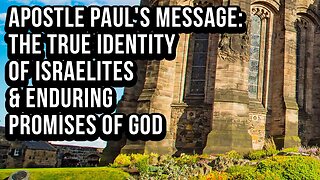 25:14
25:14
Truth in History
1 year agoDon't Believe Me, Believe the Apostle Paul
299 -
 2:00
2:00
Tomboyle868
1 year ago12 Encouraging Bible Verses from the Acts of the Apostles
238 -
 29:43
29:43
Campbellfamily07
6 months agoActs Chapter 13: Establishment of Churches and Paul's Missionary Journeys
151 -
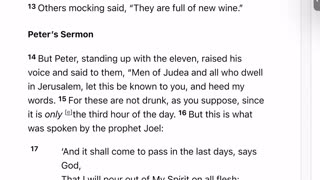 22:44
22:44
Campbellfamily07
6 months agoACTS 2 Study: Sermon Analysis: Prophetic Themes in Acts
107 -
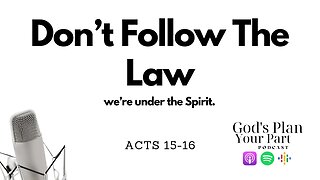 14:48
14:48
Gods Plan Your Part
5 months agoActs 15-16 | The Church Resolve Their Conflict and Paul and Barnabas Don't
73 -
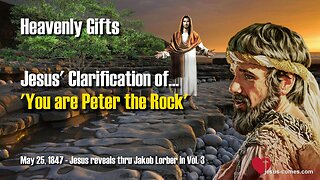 17:29
17:29
Jesus' Revelations thru Jakob Lorber English
1 year agoJesus' Clarification of... You are Peter the Rock ❤️ Heavenly Gifts revealed thru Jakob Lorber
167 -
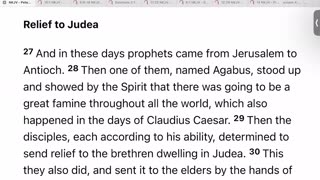 27:54
27:54
Campbellfamily07
6 months agoActs 11 Bible Study: Peter Defends God’s Grace...
97 -
 53:27
53:27
We Must Take A Stand Today For Christ If you wont stand for something you will fall for anything
11 months agoPaul's Principles For Living. Part 5. 2 Timothy 4. Pastor Hobbs Bible lesson
231 -
 22:55
22:55
Gods Plan Your Part
3 months agoMark 7 | Tradition Versus God's Commandments: Examining Faith and Societal Barriers
34 -
 10:09
10:09
Whole Bible Christianity
1 year agoA Whole Bible, Paul's Teachings: Galatians
16